Long Road Home focuses on the compelling stories of Pittsburgh area veterans coping and healing with the emotional wounds of war, after combat in Iraq, Vietnam, Korea, and World War II. The documentary also explores current treatments and research into Post Traumatic Stress Disorder (PTSD) among returning veterans.
About Long Road Home
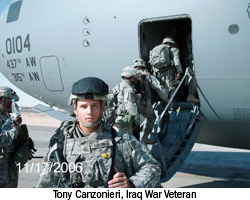 When Tony Canzonieri returned from his tour of duty in Iraq, he struggled with nightmares, flashbacks and alcohol. His marriage fell apart. He lost his job. But once Tony acknowledged the symptoms and was treated for Post Traumatic Stress Disorder (PTSD), his healing began and his life changed. Now in his role as director of Vets4Vets in Western Pennsylvania, Tony is helping other veterans who are now dealing with the problems he once faced.
When Tony Canzonieri returned from his tour of duty in Iraq, he struggled with nightmares, flashbacks and alcohol. His marriage fell apart. He lost his job. But once Tony acknowledged the symptoms and was treated for Post Traumatic Stress Disorder (PTSD), his healing began and his life changed. Now in his role as director of Vets4Vets in Western Pennsylvania, Tony is helping other veterans who are now dealing with the problems he once faced.
A 2008 RAND Corp. study estimates that nearly 20 percent of all military members who returned from Iraq and Afghanistan reported symptoms of PTSD or major depression, yet only about half went for treatment. As Tony and other Iraq War veterans are finding out, many others have gone before them. The documentary also includes the compelling stories of veterans who served in Vietnam, Korea and World War II – yet still feel the emotional wounds of war.
As America addresses the PTSD issue, there are successful therapies now, and promising research into future treatment – as viewers will see in a segment that focuses on a unique study at the University of Pittsburgh Medical Center where doctors are exploring the sleep and brain patterns of veterans who are coping with PTSD.
Long Road home is brought to you by WQED’s Emmy Award winning team of writer/producer David Solomon and photographer/editor Paul Ruggieri, narration by Michael Bartley, with funding from The Staunton Farm Foundation.
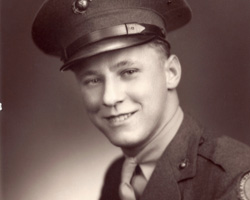
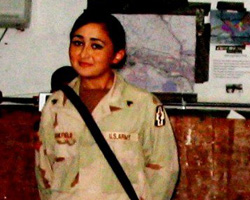
Personal Stories & Suggestions
Help for Post Traumatic Stress can be found at EFT.com, a website with links to learn a technique which is a combination of accupressure and psychology, and helps to reset the brain. It has been introduced to many VA Health Care Centers, with great success. — Deborah G. Rhodes, VAPHS
I was part of the life-changing Vets4Vets Weekend that Tony, Shawn and Michelle took part in. If you are out there and you know you need help but don’t know where to turn, get yourself to a Vets4Vets gathering! There is nothing like peer support – just being with others who’ve been where you’ve been and are willing to just be there for you. — Sharon, Cedar Creek, NE
Service members and Veterans, the best I can do as a thankful civilian is to honor you by ensuring that the services we provide at the VA are worthy of you. I sweat each day to try to make this a reality–best care, anywhere. — Anonymous, PA
i have never served in the military. i would just like to say that the long road home was one of the most moving shows i have ever seen. i so much appreciate what these men and women did for this country. i wish the best for them. i usually don’t comment like this, but the show really moved me; really made me think of the sacrifices my own father made in WWII, but was too young to understand what he did. good luck to everyone. — michael kleer, pittsburgh, pa
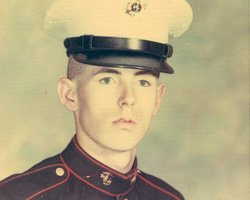
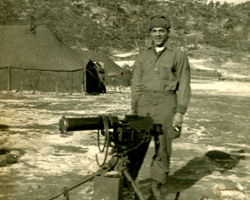
Resources & Related Links
Long Road Home WatchLearnShare (pdf)
Understanding PTSD (pdf)
Invisible Wounds of War, RAND Corp. Study
University of Pittsburgh Sleep Research Studies for Military Veterans
PBS NEWSHOUR report “A Young Veteran and His Dog”
National Institute of Mental Health
American Public Television is proud to make this WQED documentary available to public television stations nationwide.

BUY Long Road Home on DVD Learn More